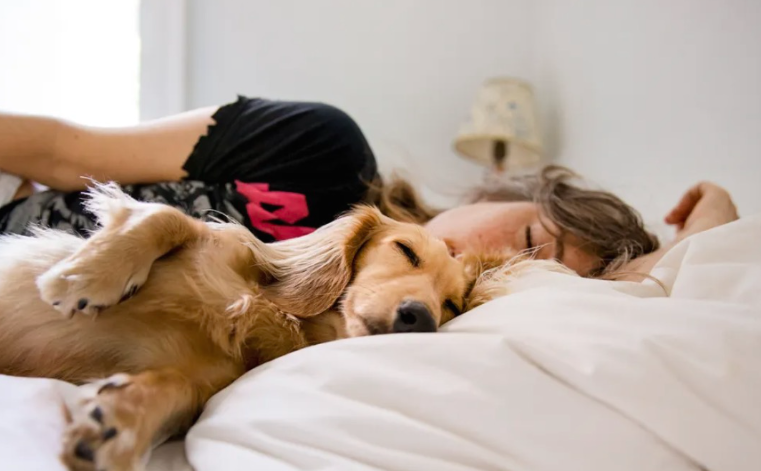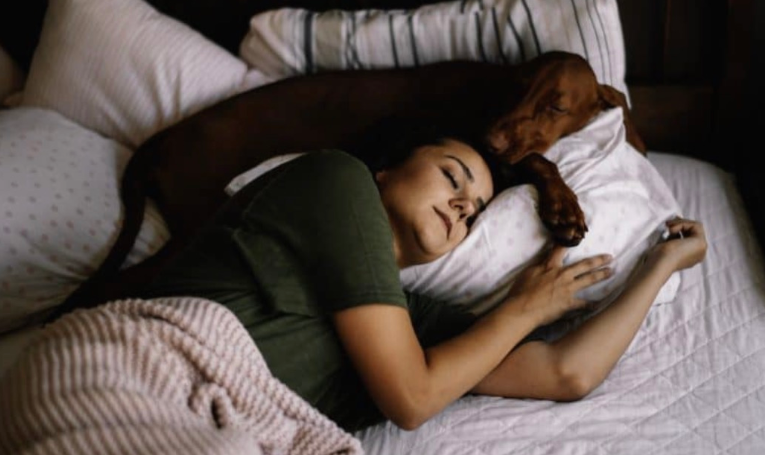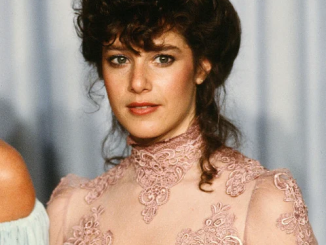
Undoubtedly, the importance of a good night’s sleep for overall health is widely acknowledged. With numerous studies exploring the optimal ways to achieve quality rest, recent research proposes a surprising solution, sharing the bed with dogs. Canisius College in New York State spearheaded this unconventional investigation, revealing that women experience better sleep next to their canine companions compared to human or feline counterparts.
Lead researcher Christy Hoffman, Ph.D., an animal behaviorist, conducted a survey involving nearly a thousand women across the United States to draw these intriguing conclusions. The results unveiled that 55% of participants shared their beds with at least one dog, 31% with a cat, and 57% with a human partner.

Hoffman delved into the reasons behind dogs emerging as superior sleep partners. The study highlighted that dogs’ sleep patterns align more closely with humans than those of cats. Hoffman theorizes that this synchronization may contribute to improved sleep quality, as dogs are adept at accommodating their owners’ sleep schedules, potentially mitigating disruptions caused by differing bedtime routines.
Furthermore, the structured routines imposed by dogs, such as morning walks, assist in regulating their owners’ daily schedules, thereby enhancing overall sleep quality. Another contributing factor is the physical stillness of dogs during sleep, unlike fidgety feline companions. Women in the study reported that dogs tended to remain on the bed throughout the night, fostering a sense of security and stability.
The study’s third crucial finding emphasizes the unique sense of security that dogs provide. Unlike cats or even human partners, dogs offer a heightened level of psychological comfort. Hoffman suggests that the perception of dogs as vigilant protectors, capable of alerting their owners to potential intruders, plays a role in enhancing the sense of security.

Despite these intriguing findings, the study acknowledges the subjectivity of sleep preferences. Factors such as a dog’s snoring or generating excess warmth could pose challenges. Additionally, there are individuals who find solace in the companionship of cats during bedtime.
It’s essential to note that the study relies on participants’ subjective perceptions of their pets’ impact on sleep quality and duration. Consequently, further research is necessary to definitively crown dogs as superior sleeping partners. Hoffman emphasizes the need for continued exploration into the various contexts under which pets positively or negatively influence sleep quality.
As American households increasingly welcome pets, understanding these dynamics becomes crucial. Future research may utilize technologies like Fitbit-like devices to objectively track sleep quality in diverse sleeping conditions, providing a more comprehensive understanding of the intricate relationship between humans and their animal companions during bedtime.
«Josh Hartnett Hasn’t Aged!» After a Long Hiatus From Hollywood Fans Are Amazed by His Timeless Appearance
Fans of Pearl Harbor actor, Josh Hartnett, are in awe as the star makes a comeback, appearing as though he hasn’t aged a day since his last Hollywood appearance. Following a prolonged hiatus from the limelight, social media is abuzz with admiration for his seemingly ageless charm and impeccable style.
He’s been absent from movies for some time.

Josh Hartnett soared to stardom with blockbuster hits like Pearl Harbor and 40 Days and 40 Nights, solidifying his status as one of Hollywood’s most sought-after actors. At the peak of his fame, Hartnett shocked fans and industry insiders alike with his abrupt departure from the spotlight.
Despite being on the brink of a promising career as a leading man in major motion pictures, Hartnett made the bold decision to step away from Hollywood. This unexpected exit left many wondering about the reasons behind his departure and what the future held for the enigmatic actor.
He has spoken about his hiatus from Hollywood.

Josh Hartnett has opened up about his hiatus from Hollywood, revealing that he initially had reservations about signing on for blockbuster roles. Despite his rising fame and the allure of big-budget films, Hartnett grappled with doubts. He admitted, «Am I just afraid that by doing Pearl Harbor, I’m going to enter a new category of filmmaking that I might not be ready for?»
However, he ultimately chose to take on the challenge, recognizing that turning down such opportunities would be driven by fear. Reflecting on his decision, Hartnett acknowledged that it shaped his career trajectory but also emphasized the importance of facing one’s fears.
In recent years, Hartnett’s relationship with fame has been a subject of interest in the media, particularly since he turned down multiple superhero roles and retreated from Hollywood life in the mid-2000s. Instead, he prioritized family life, moving back to his home state of Minnesota and later to London, where he focused on artier, more intimate projects while raising his family. Hartnett’s journey serves as a testament to the complexities of navigating fame and personal fulfillment in the entertainment industry.
Now he has to prove himself to get the roles he wants.

Josh Hartnett finds himself navigating a new chapter in his career, where he’s eager to showcase his talent in roles that hold personal significance. «I’m happy to be done with that era and to be making films that are more personal to me,» he shares, emphasizing his satisfaction in moving away from past blockbuster roles.
Directors are now approaching him for characters rather than hero roles, a shift that excites him creatively. Reflecting on the industry’s changes, Hartnett notes, «When I see a role now, I’ve got to fight for it.»
Despite the increased competition, he sees the challenge as rewarding, stating, «It’s actually more rewarding. Depressing when something doesn’t go your way, but only for a minute.» Hartnett’s journey underscores his resilience and commitment to pursuing roles that fulfill his artistic aspirations, marking a compelling evolution in his Hollywood career.
Fans are shocked by his recent looks.

Recently, Josh Hartnett has garnered attention for his role in the Oscar-winning film Oppenheimer, where his performance has captivated audiences. His appearance at the movie’s premiere has sparked admiration, with fans expressing astonishment at his recent looks. «If I had known Josh Hartnett was in Oppenheimer, I would’ve watched it a lot sooner,» one fan remarked.
Another fan echoed the sentiment, proclaiming, «I’m here for the Josh Hartnett Renaissance,» indicating a resurgence of interest in the actor’s career. Comments like «Josh Hartnett hasn’t aged» and «Josh still be looking fine to me» further attest to the widespread admiration for Hartnett’s enduring appeal and timeless charm. As his performance continues to generate buzz and reignite fan enthusiasm, Hartnett’s presence in Oppenheimer signifies a notable milestone in his career resurgence.
In a candid revelation, Hollywood heavyweight Mark Wahlberg opens up about a pivotal decision that led to his temporary departure from the glitz and glamour of Tinseltown: his children. The acclaimed actor and devoted father shares the deeply personal reasons behind his hiatus, shedding light on the sacrifices and priorities that come with parenthood in the spotlight.
Preview photo credit Supplied by Capital Pictures / East News, Vianney Le Caer / Invision / East News



Leave a Reply